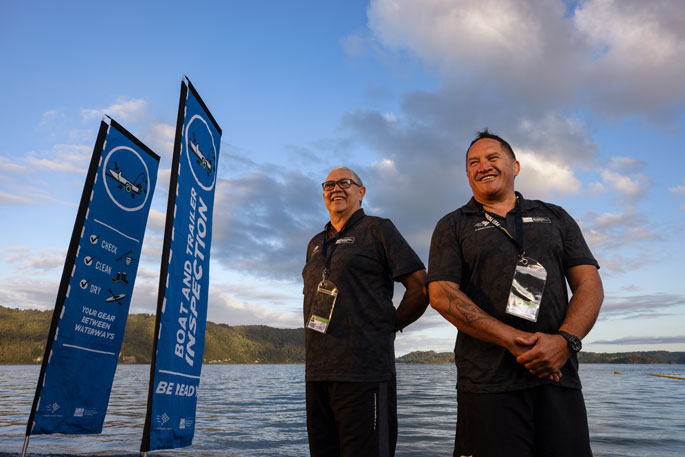Even before the sun rises this Saturday, keen anglers will be donning their waders, checking their boats and readying their fishing rods for the Opening Day of trout season.
It is the most anticipated day of the year for trout fishermen and for the majority, the focus will be on how favourable the weather is, which lakes will have the best yield and who will snag the biggest fish.
But behind the scenes, Te Arawa Lakes Trust will be leading a comprehensive biosecurity operation to ensure our lakes, our fish and our people are protected from invasive aquatic pests.
The dedicated team of Te Arawa hunga tiaki will be out in force at Tarawera, Rotoiti and Ōkataina lakes in the days leading up to and after Opening Day, doing boat ramp inspections to ensure boaties are aware of and are following pest management regulations.
While there will be an enhanced presence of Te Arawa hunga tiaki around Opening Day, Te Arawa Lakes Trust is committed to its biosecurity advocacy mahi year-round.
Te Arawa Lakes Trust Biosecurity Manager, William Anaru, says since the Trust became involved in the aquatic biosecurity space, interest from the whanau has grown The team have been able to add four new officers this year with a total of 19 biosecurity inspectors warranted under the biosecurity act.
'At a time when Covid has impacted employment across our region, this kaupapa not only protects our taonga but it has provided employment and training opportunities for our whānau.
'We want everyone using our lakes to have an enjoyable fishing season and adhering to our biosecurity measures shouldn't hinder this.
'In reality, if we do not take the necessary steps to prevent the spread of pest weed and species now, the long-term health of our lakes and wildlife could be threatened.
'It's vital that everyone on our lakes, regardless of whether they are fishing, water skiing or cruising, thoroughly checks their boat, trailer and gear before and after every trip.
'Our lakes are taonga and even the smallest piece of weed or fish egg can create a major biosecurity issue in a lake or waterway.”
Self-certification checkpoints are set up at popular boat ramps around Rotorua and are clearly signposted with forms that should be completed and displayed on the dashboard of the vehicle used to launch the vessel.
'Protecting our lakes is the responsibility of all. If everyone is committed to preventing the spread of pest weed and species, we will be able to enjoy this taonga for generations to come.”
How to Check, Clean, Dry
If you're moving between waterways you can help to reduce the spread of freshwater pests by using the 'Check, Clean, Dry' (CCD) method:
- Check all equipment and your vessel and trailer and remove any weed fragments before leaving the boat ramp.
- Clean all equipment that has come in contact with the water using a decontamination solution* as soon as practical
- Drain all water by removing bungs or sponging out any lying water in your vessel when you exit the waterbody.
- Dry equipment thoroughly before using it another waterbody.
Do it between every waterway, every time.
- Source: Bay of Plenty Regional Council



0 comments
Leave a Comment
You must be logged in to make a comment.